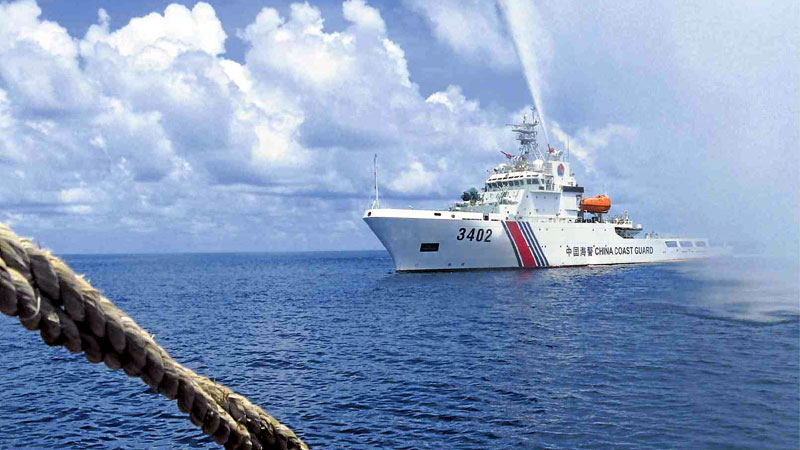
SEA DISPUTE. In this photo taken on Sept. 23, 2015, a Chinese Coast Guard vessel fires its water cannon on Filipino fishermen in a confrontation off Scarborough Shoal in the West Philippine Sea. A UN court is expected to issue a ruling today on a complaint filed by the Philippines questioning China’s territorial claim over almost all of the sea, including its reefs, shoals and islets. AP
MANILA, Philippines—China isn’t letting the COVID-19 pandemic get in the way of its objective to wear down rival claimants in the South China Sea and “overwhelm the region,” according to a maritime security expert on Tuesday (April 14).
“China’s not going to stop,” said Gregory Poling, executive director of Asia Maritime Transparency Initiative, a Washington-based think tank monitoring developments in the South China Sea.
“If a global pandemic doesn’t cause China to calm things down in the South China Sea there’s not much that will,” said Poling at an online forum hosted by Foreign Correspondents Association of the Philippines (Focap).
“China’s intent is to overwhelm the region” through its Navy, Coast Guard and militia fishing fleet, Poling said.
He said China won’t stop until “Southeast Asian governments decide that there is no reasonable choice but surrender and that they should just take whatever deal Beijing’s putting on the table and go home.”
“Our data suggest that there’s nothing different today that China wasn’t doing six months ago and presumably that China won’t be doing six months from now,” Poling said.
Beijing, he said, “has a long term intent to establish de facto control over all the sea and airspace and the seabed within the South China Sea.”
While wearing a friendly mask in front of other nations by providing protective gear, medical supplies and medical experts to help contain the global spread COVID-19, which started in China late last year, it’s business as usual for Beijing in South China Sea.
“At a time when obviously all of Beijing’s top level attention is focused on the pandemic, this low level harassment of fishers, of oil and gas operators, of regional law enforcement continue,” Poling said.
He said this was “one more sign that it’s not as if Xi Jinping is actually paying attention to the day-to-day operations” in South China Sea.
China’s “low level actors”—nonprovincial governments, Navy and Coast Guard—are encouraged to have standing orders, go out and assert sovereignty.
In the highly-contested waters, China Coast Guard and militia vessels continue to intimidate military vessels, fishing boats and oil and gas rigs of other claimants.
A China patrol vessel rammed and sank a Vietnamese fishing vessel early this month. The case was similar to the ramming by a Chinese fishing vessel of a Philippine fishing boat.
The Chinese government last month opened two research stations on Kagitingan (Fiery Cross) and Zamora (Subi) reefs, two of China’s seven man-made military bases in the Spratly Islands in the West Philippine Sea.
A Chinese military transport plane was also spotted on Kagitingan Reef in March, another indication of China’s unceasing operations as the world is being gripped by the COVID-19 pandemic.
Despite the aggressive actions, Poling said Beijing is avoiding face-to-face confrontation with other claimants in the South China Sea. What China wants is to wear these claimants down until they “surrender,” said Poling.
The Philippines, in a rare move, recently expressed solidarity with Vietnam after China’s reported sinking of a fishing boat. But the “flowery language” used by the Philippine Department of Foreign Affairs sounds hollow to Poling.
“It doesn’t call out China. It doesn’t mention anything about who did the ramming or what Beijing should do about it. It just says, we hope everybody comes down and comes back to the table,” he said.
“The letter was stronger than recent statements out of the current DFA but saying that it’s a stronger statement than we have heard out of the DFA recently doesn’t say a whole lot,” Poling said.
For now, it appears that the status quo is stable in the South China Sea. But Poling thinks it won’t last long.
“Sooner or later, luck’s going to run out. We’re going to have dead mariners in our hands,” Poling said.
“And when there are bodies in the water, governments around the world are going to have to decide whether or not they want to speak up,” he said.
“I wish that we could get there before that happens, but it seems like that’s the only thing that’s going to wake everybody up,” Poling said.